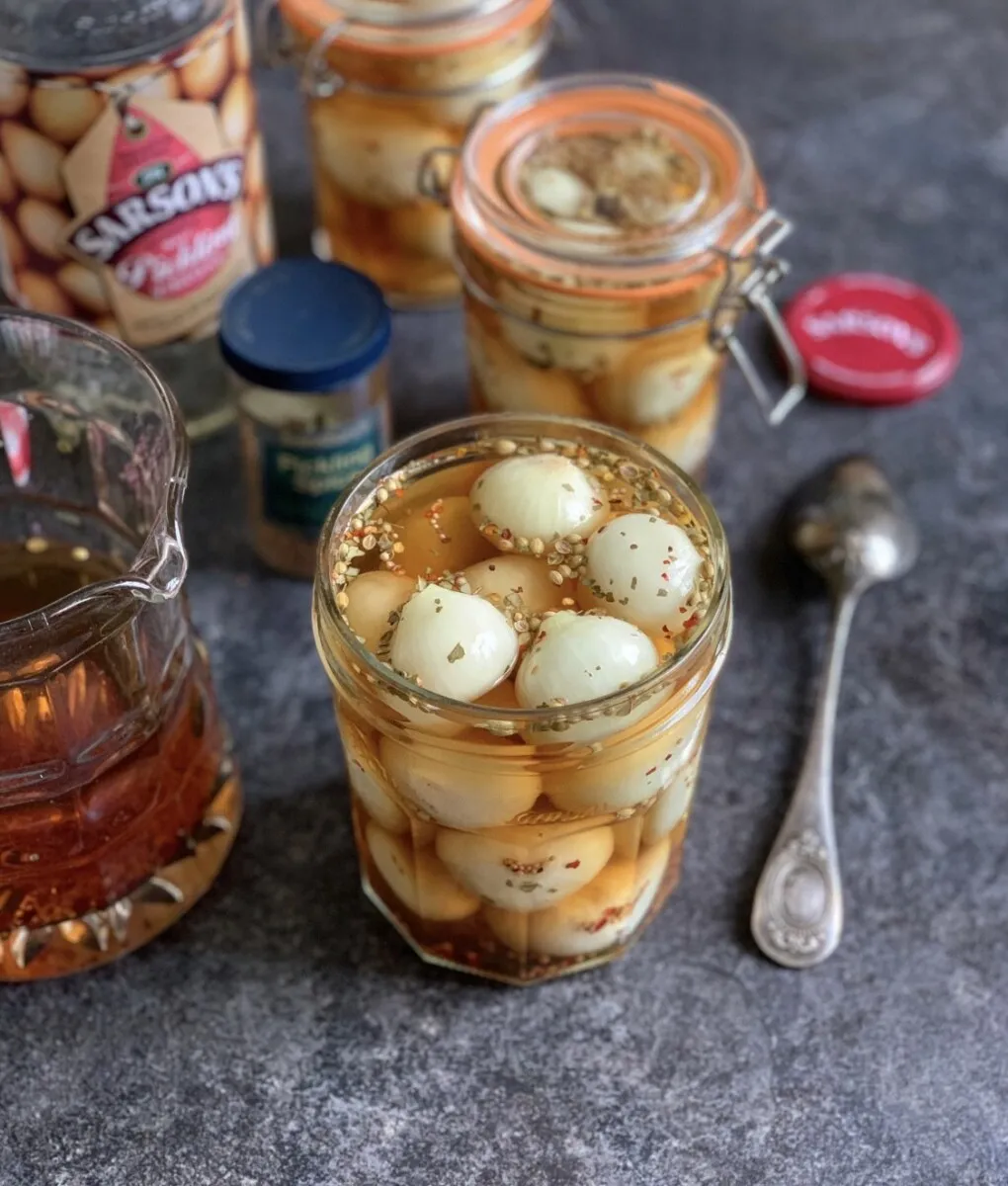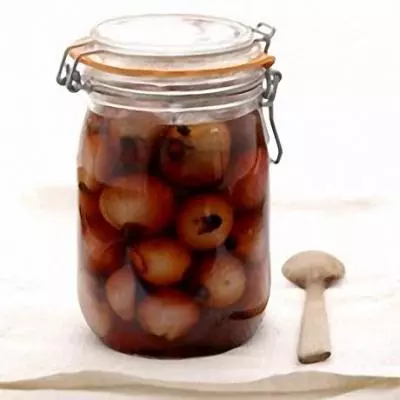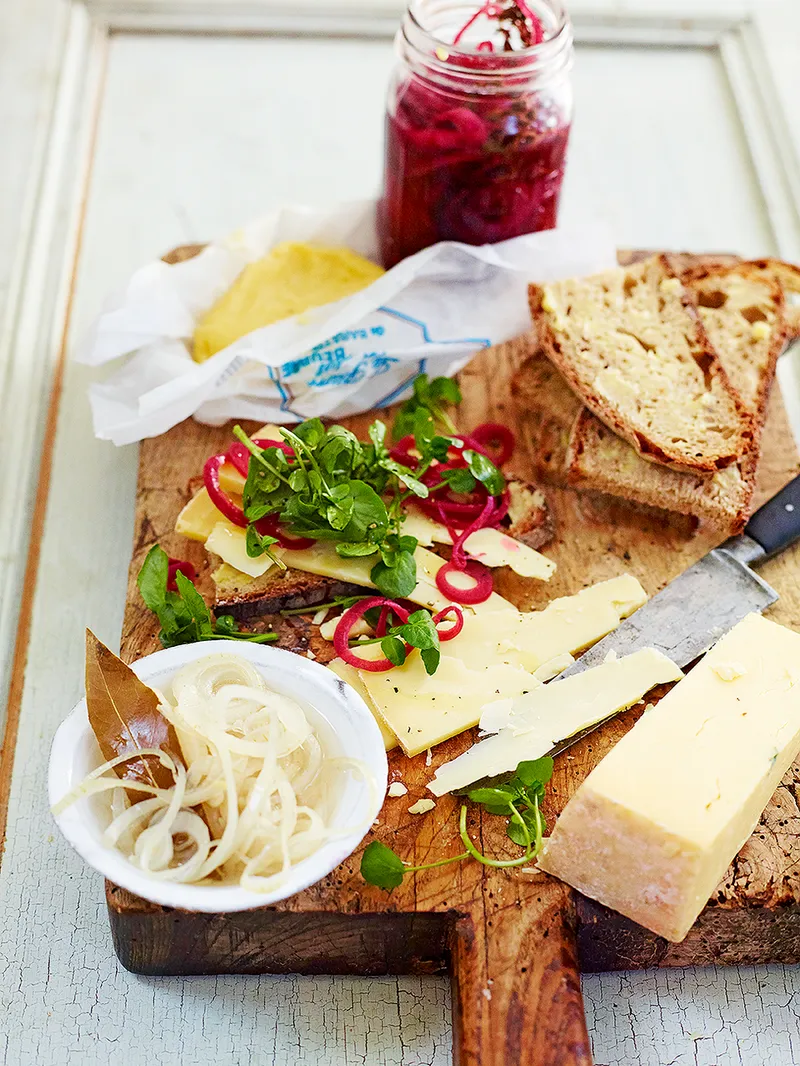"Pickle a big batch, put them on everything."

There are the ones in the jar - brown and whole, and the ones in a dish - sliced, pink and pretty. I was just going to write about the brown ones, in a fit of nostalgia, but then I started to think about the other kind - the trendy pink ones that you see everywhere all the time. And I guess it's really them that the anonymous quote above refers to. Besides they are so ubiquitous that they cannot be ignored.
I learnt two things from today's research. The first was a method of skinning all those small onions, if you are going for the British pickled onion version. You chop off the top and bottom, put them in a bowl, pour boiling water over them and leave them for a couple of minutes, after which, when drained the skin will come off easily. A bit like tomatoes I guess. The various recipes I shall mention do this in slightly different ways, with some making use of the water, some not, but that's fundamentally the trick.
The second thing is that autumn is the time to make your pickled onions because that's when the small pickling onions come on to the market. Which seems slightly odd. I mean you think of small things and spring don't you? But yes, that would be right. You made the pickled onions around October/November in time for Christmas, although I'm not really sure why you would want them for Christmas. After all they are not part of the Christmas meal.

No - the good old British pickled onion is something you eat with a Ploughman's lunch, fish and chips or just with cheese I suppose. I know we always had some, and I do remember making them with Grandma. We all used to pitch in with peeling the onions because we obviously didn't know about the boiling water trick in our house.
I haven't had one for years, but I have to say my interest in pickling things has been revived of late. So far I have tried a few different things with varying degrees of success. Artichoke hearts - now pretty old, but still in the fridge. A friend gave me a whole lot of them from her garden. Now I'm not a fan of artichokes, but having seen Jamie chop pickled ones and throw them into something I thought I would have a go. Alas I just forget that they are there. It's a similar story with my pickled peaches - this time from a glut of my own peaches last year. They taste yummy but look brown and uninviting, so just putting them out with cheese doesn't work. Nobody tries them. I shall just have to cook them with something. Cucumbers of varying kinds, including zucchini - very successful. Asparagus ditto - I put some out at David's last wine group and they nearly all went.

My revived interest in pickled onions came from seeing a recipe in The Guardian newsletter, by Rosie Birkett for this Lazy cheeseboard tart. Not only is it a recipe for using up all those odd bits of cheese in your fridge, but it also included various pickles including pickled onions. So I thought that I would buy a jar of pickled onions from the supermarket. However, when I looked I saw that all the jars were pretty large, and I didn't want to get a large jar, because some commercial ones are a bit too sweet. And I didn't think I would use them a lot anyway. Besides I really don't like buying pickles of things you can pickle yourself. Cornichons and capers - Ok. Fair enough but not pickled onions. So I'm on the lookout for pickling onions and will give it a go. In the meantime I might try the recipe with some other kind of pickle - maybe those artichokes or peaches.
Mind you which recipe for pickling the onions, if I find some, shall I follow? It's not that simple. You would think that something like this would be just one basic recipe that everybody had. And before I go there, I was slightly surprised at Jamie and Nigella for not having a recipe at all. Or Jane Grigson either. I was particularly surprised at Jamie, who, after all, grew up in a pub.
but back to that recipe - there are all sorts of subtle differences - there is no Ur recipe. Sprinkle the onions with just salt and leave overnight, salt and water, just water ... Just salt and then again with water - and variations thereof. Or don't bother with all of that anyway and just pour your pickling liquid over the peeled onions. I shall have to peruse them all more closely before I choose which one. Oh and some of them preferred to go with shallots anyway.
These are the ones that I found: Australian Women's Weekly; The Spruce Eats; Grandma's pickled onions from Australia's Best Recipes; Nan's pickled onions from a Guardian reader and Traditional home-made pickled onions from Lavender and Lovage. (The Women's Weekly used the painting at the top of the page, and there was no picture for Nan's pickled onions):
Most of them used malt vinegar, although of course, you can vary this to taste, although for me to be genuine it has to be malt, and the spices they used varied as well. I think my grandmother, and my mother, just used to buy a jar of pickling spices from the grocer's shop. The amount of sugar and the amount of heat varied too, but I do remember a bit of heat in ours. Then there were two outliers - Delia has decided that shallots and sherry vinegar give a better result - Pickled shallots in sherry vinegar - and the Hairy Bikers go for balsamic with their Balsamic pickled onions - which would be quite different. The recipe is not on their own site, but a site called Rusty's Room.
These days, however, it's all about the quick pickled onions - usually red that you find everywhere.

I'm pretty sure I have featured this recipe for Cheesy curried butter beans on toast before from the Yotam Ottolenghi Test Kitchen's Extra Good Things. It's the first recipe in the book and features pickled onion - a very simple version which is just three things, red onions, apple cider vinegar and a little green chilli - mixed together and marinated for a brief time. I am definitely going to make this one day soon. It's very typical of the way that this kind of pickle is used these days - as Ottolenghi says:
"I’m talking about quick-pickled onions, which, with the help of vinegar or citrus juice, a little sugar, some salt and a whole range of potential aromatics, offer a marvellously effortless way to inject all kinds of dishes with an oniony freshness that transforms them.
The magic is that the onions soften, sweeten and, for an extra visual ta-da!, turn bright pink." Yotam Ottolenghi

Nigel Slater is a fan too:
"I cannot tell you how useful this pickle is. This week alone I have used it with the duck salad and the cheese and apple pastries. It will live, happily, in a stoppered jar in the fridge for weeks. I usually make this with golden sultanas – less sweet than large, dark brown raisins, but went with some dried mulberries instead. They offer the same pleasing jolt of sweetness among the vinegars."
You will find this kind of thing, dressing everything from toasted sandwiches to cheese boards, as well as salads (e.g. Meera Sodha's Radish, red onion and pomegranate salad), tray bakes, stir fries - anything really.

Even River Cottage pitches in with their Dressed up onions (no picture) and Ottolenghi spices it up with Sumac pickled onions.
Trendy though they are, and yes, you should certainly have a jar in your fridge at all times - they will keep for a week or so - they really come from those simple Indian salads, like onion salad and Kachumbar that are served in every Indian restaurant. Well probably from a whole range of similar things from all over Asia and the Middle-East. Onions are an ancient food and pickling is an ancient method of preserving them. But isn't it wonderful how the cooks of today find so many tempting ways to bring them to our notice and get us excited all over again about cooking.
Final thought. Don't throw away the pickling liquid either:
"that pale pink pickling liquid is absolute gold as well. You can use it anywhere you would add a splash of vinegar or citrus for a bit of brightness, with the added benefits of all that oniony flavor from, you know, the onions. Vinaigrettes are the obvious move here, but a few spoonfuls will also make for the best bloody Mary or michelada you've ever had." Carey Polis - Bon Appétit













Comments